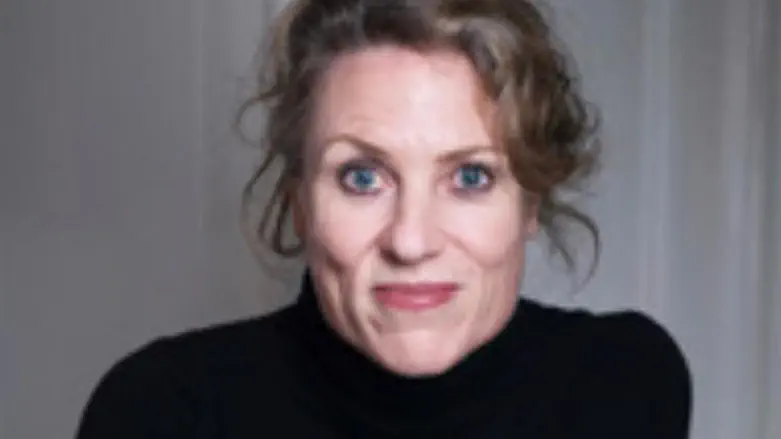
“My first book appeared in 2000 and discussed Israel’s internal conflicts regarding the state’s identity. The Dutch title translates into English as 'A People that Dwells Alone.' I published my next book in 2007 which deals with the divisions between Christians in Israel. The title translates as 'Holy Quarrels'.”
Els van Diggele was born in 1967 in the Dutch village of Warmond. After her history studies at Leiden University she followed a postdoctoral journalism course at Rotterdam’s Erasmus University.
“I wanted to complete a trilogy by writing about the Palestinian Arabs. I resided in the Palestinian Authority region, carefully looking for people who would dare to tell the truth. Otherwise I would only hear: ‘Everything is fine. The Israeli occupation is the problem.’
“My first insight occurred when a Palestinian Arab asked me: ‘Do you write about our occupation? We are occupied by our leaders. The Palestinian occupation starts in our family with our father and uncles. Afterwards we are occupied by our boss and our leaders. The individual does not exist.’ He added: ‘That is our greatest real problem and explains our society’s stagnation.’
“I lived for a year in the Palestinian Authority territories. I did not register as a journalist with the authorities. I was not hindered by the authorities in any way, though there have been people who suspected me of being a spy.
“In Gaza I also did not encounter any hindrance. Interviewing there was even easier than in the 'West Bank.' In Gaza people are also fearful and society is very hierarchical. Yet the people were more open, perhaps because they are poorer and more desperate. It became clear to me that there is no historical unity between the 'West Bank' and the Gaza Strip. It is as if living in different worlds.
“The sole hindrance I encountered was at Nablus University on the 'West Bank'. I asked the students about a murder committed in 2007. I wanted to know what happened and where it took place. Some people reacted: ‘What murder? I know nothing about it.’ This response is characteristic for a culture of fear which frequently results in the denial of facts. A second time I visited with a Palestinian woman who had studied there. I was called to the university’s management which forbade entry.

“Many journalists have become participants in what they report about. Thus facts are no longer relevant. This results from fifty years of one-sided reporting... “Looking through history’s lens at Palestinian Arab society, I concluded that there was a century of stagnation, destruction and a power battle which was fought on the back of common Palestinians. Nobody asked them anything.
“Looking through history’s lens at Palestinian Arab society, I concluded that there was a century of stagnation, destruction and a power battle which was fought on the back of common Palestinians. Nobody asked them anything.
“This attitude runs as a common thread through Palestinian Arab society. A strong example is the pushing out of former Prime Minister Salam Fayyad. I spoke with this moderate man and also with Hamas executives. The moderate voice cannot succeed in Palestinian society.
“The picture I obtained from conversations with cooperative Palestinians is greatly different from what we have been told during the past fifty years by the State News Service NOS and the major Dutch newspapers. That obsolete picture tells us that the Palestinian Arabs are powerless victims of the Israeli occupation which has lasted for fifty years.
“The new picture I came to understand is the opposite of the one I had before I started my research. It was a shocking but interesting discovery. I realized that this new picture cannot be revealed in the Netherlands.
“I started to grasp this situation slowly. Many Dutch people are emotionally involved with the Palestinian Arabs. They believe that they live in an underprivileged society which ome is not allowed to criticize. Journalists and experts are both so emotionally involved that they cease to practice their profession properly.
“Many journalists have become participants in what they report about. Thus facts are no longer relevant. This results from fifty years of one-sided reporting in Western Europe.
“The title of my 2017 book about the Palestinians translates as: We hate each other more than the Jews. People in the Netherlands told me: “You were not allowed to write this book. You know about the occupation. Everything results from the colonial rule. The Palestinian Arabs have never been able to form their own government because they were ruled by foreigners.”
“I replied: The stifling division among the Palestinians has already lasted for a century. One cannot blame England or Israel for that.
“It is strange that I cannot reason in the Netherlands with anybody in a serious well-argumented and rational way about my book. People do not understand the nature of the Middle East. Weapons are everywhere in Palestinian Arab society.
“Fayyad wanted to create an orderly state by working together with Israel He said: ‘A state is not only our right but also our duty. We need law and order, disarmament and a fight against corruption.’
The Palestinians did not want this. They preferred resistance. Abbas pushed Fayyad out.”
Van Diggele concludes: “I am now working on a short book of which the title translates as: 'The misleading industry: Dutch media in the iron grip of Palestine'. Publication is planned for early 2019."